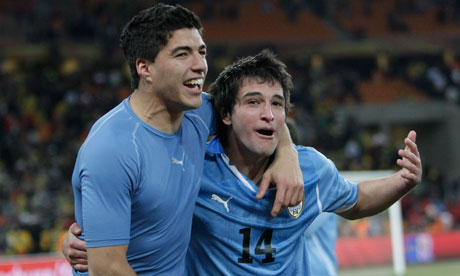
Richard Williams nailed it in his blogpost yesterday:
Many commentators have noted that 999 footballers out of 1,000 would have done as Uruguay's Luis Suárez did in the 122nd minute when he raised his hand to block a goal-bound shot, but that does not make his instinctive reaction the right one. Poor Asamoah Gyan's inability to convert the penalty that would have made them Africa's first semi-finalists turned this into the biggest distortion of justice at any World Cup since West Germany eliminated France in the 1982 semi-final after Harald Schumacher's assault on Patrick Battiston.
Forget the Frank Lampard goal that wasn't and the Carlos Tevez goal that was, Suárez's added-time Superman act on the Uruguay goalline has trumped them both. Ghana's players had hardly crumpled to the turf following their shoot-out defeat before the calls for justice and vengeance began. Suárez did not help himself in the aftermath. Contrition might have brought a modicum of forgiveness but "the hand of God now belongs to me", "I made the save of the tournament" and his wild celebrations as he delayed trudging down the tunnel to watch Gyan miss the spot-kick, only serve to increase the acuteness of the irritation.
Does the punishment fit the crime? While Suárez's absence from the semi-final is certainly a major blow to Uruguay, they would not have been there at all if it were not for his illegal intervention. If a less important player, a reserve right-back, say, deputising for a suspended first choice – made the "save", the disparity between crime and punishment might have been even worse.
• Follow the Guardian's World Cup team on Twitter
• Sign up to play our daily Fantasy Football game
• Stats centre: Get the lowdown on every player
• The latest semi-final news, features and more
Time for penalty goals, then? Graham Poll in today's Mail writes: "Many argue [Suárez] merely acted instinctively. If that is true then awarding a penalty goal and a yellow card seems more appropriate. Then the wronged team would not be denied a goal and the instinctive act less harshly punished."
It works in rugby, the proponents argue. In union, if "a player would probably have scored a try but for foul play by an opponent, a penalty try is awarded". That word "probably" simply would not work within the rules of football and even to replace it with "definitely" would leave too much open to interpretation. The Suárez incident was conclusive, but that is not the case with every handball. If a seemingly goal-bound shot strikes a hand six yards out, does a penalty goal then result? No? Then how close to the line does a handball have to be? What if there is a player behind the culprit who might, with an extraordinary effort, make a legal block? What if the guilty player has his hand in front of his face? What if the ball might be heading towards the inside of the post?
And wouldn't it set a precedent for other penalty goals? A player takes the ball round the goalkeeper with the goal gaping only to be taken down – penalty goal? An attacker tripped by a defender just as he is about to tap a cross home – penalty goal? A dog runs on the pitch and snouts the ball off the line – penalty goal? But then … should we always shy away from a fairer game just because of the potential problems inherent? Faint hearts never won a fair football.
Or should we be looking simply at better enforcements of the rules we already have? Of greater imminent use might be for referees to get tougher on keepers moving off their line when facing penalties (arguably, if you really want to push it, why many players prefer to aim penalties high and therefore run a greater a risk of, like Gyan, missing the target). In essence, the argument is the same as that raked over after the goals and non-goals of Tevez and Lampard earlier in the tournament. Football always has its injustices: the question is whether we have to put up with them.

